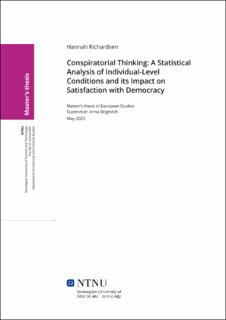| dc.contributor.advisor | Brigevich, Anna | |
| dc.contributor.author | Richardsen, Hannah | |
| dc.date.accessioned | 2023-06-23T17:20:20Z | |
| dc.date.available | 2023-06-23T17:20:20Z | |
| dc.date.issued | 2023 | |
| dc.identifier | no.ntnu:inspera:144932901:34403585 | |
| dc.identifier.uri | https://hdl.handle.net/11250/3072988 | |
| dc.description.abstract | Konspirasjonsteorier har vært til stede i det moderne samfunn helt tilbake til antikkens Hellas. I dag er konspirasjonsteorier, uten tvil, mer synlige og normaliserte i samfunnet. Dette kan sees gjennom stormingen av Capitol-bygningen i USA, så vel som alle konspirasjonsteoriene som dukket opp under Covid-19-pandemien. Denne oppgaven undersøker hva som betinger konspirasjonstenkning på individnivå, samt hvordan konspirasjonstenkning påvirker hvor tilfreds individer er med demokratiet de lever i. Oppgaven består derfor av to analyser, som begge bruker en flernivåmodell. I den første analysen blir tre forskjellige varianter av konspirasjonstenkning behandlet som avhengige variabler (generell konspirasjonstenkning, anti-vitenskapelig konspirasjonstenkning og Covid-19 konspirasjonstenkning). I denne analysen fremstår faktorer som autoritarisme, mellommenneskelig tillit, politisk tillit, politisk maktesløshet, religiøsitet og utdanning som sterke forutsetninger for konspiratorisk tenkning. Analysen viser også at når det kommer til hva som påvirker konspirasjonstenkning finnes det også ulikheter. Her er alder og radikal høyreposisjonerings påvirkning på Covid-19s konspirasjonstenkning et godt eksempel. Dette fremhever at det er noe faktorer som er innholds og kontekst avhengige, og forholdene burde studeres videre for å forstå hvorfor visse faktorer påvirker konspiratorisk tenkning. I den andre analysen blir det klart at konspiratorisk tenkning, uavhengig av kontekst og innhold, har negativ innvirkning på tilfredsheten med demokratiet. Her er de samme konspiratoriske tenkevariablene fra den første analysen brukt, bare at de her er behandlet som uavhengige variabler og tilfredshet med demokratiet er den avhengige variabelen. Det faktum at konspirasjonstenkning har en sterk negativ innvirkning på hvor tilfreds individer er med demokratiet de bor i, indikerer at konspirasjonsteorier utgjør en trussel mot demokratiet som styreform. Dette fordi forskning har vist at lavere grad av tilfredshet med demokrati som styreform kan føre til et ønske om reformer i en ikke-demokratisk retning. | |
| dc.description.abstract | We know that conspiracy theories have been present in modern societies since the ancient Greeks. Today, conspiracy theories are more visible and normalized in society. This can be seen through the storming of the Capitol building in the United States and all the conspiracy theories surfacing during the Covid-19 pandemic. This thesis examines what conditions conspiratorial thinking on an individual level, as well as how conspiratorial thinking impacts satisfaction with democracy. The thesis, therefore, consists of two analyses using a multilevel model. In the first analysis, three different variances of conspiratorial thinking are treated as dependent variables (general conspiratorial thinking, anti-science conspiratorial thinking, and Covid-19 conspiratorial thinking). In this analysis, factors such as authoritarianism, interpersonal trust, political trust, political powerlessness, religiosity, and education emerge as robust predictors for conspiratorial thinking. However, it also becomes evident that there are differences in what conditions conspiratorial thinking, and here age and radical right positioning impact Covid-19's conspiratorial thinking differently. This shows that there are context and content-dependent factors and relationships. These should be studied further to understand why certain factors impact conspiratorial thinking. In the second analysis, it becomes clear that conspiratorial thinking, regardless of context and content, has a negative impact on satisfaction with democracy. Here the same conspiratorial thinking variables from the first analysis have been used; only they are treated as independent variables, and satisfaction with democracy is the dependent variable. The fact that conspiratorial thinking has a strong negative impact on satisfaction with democracy arguably indicates that conspiracy theories threaten democracy. This is because research has shown that lower levels of satisfaction with democracy can lead to a wish for reforms in a non-democratic direction. | |
| dc.language | eng | |
| dc.publisher | NTNU | |
| dc.title | Conspiratorial Thinking: A Statistical Analysis of Individual-Level Conditions and its Impact on Satisfaction with Democracy | |
| dc.type | Master thesis | |
